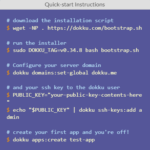Heroku has been the darling of the platform-as-a-service space since it was snatched up for around US$250 million by Salesforce.com earlier this year. Earlier this week, Heroku added to its clout in the Ruby community by hiring Ruby creator Yukihiro “Matz” Matsumoto to its staff. The move comes alongside the announcement that Heroku now supports the running of Clojure applications within its cloud.
Byron Sebastian, general manager of Heroku, said that the company’s latest round of hires includes a number of Ruby core developers from Japan. “Matz is going to keep focusing on the Ruby language. That’s it, that’s the story,” he said.
“I went over to Japan in February, and had the privilege of meeting Matz. We talked, and the question I asked was, ‘How can I help Ruby?’ We believe the more people that are using Ruby, the better it is for Heroku. The key thing that came to the surface was providing support for the Ruby language and for the people moving the language forward. We’re also bringing on a couple of other folks in Japan who have been longtime contributors to Ruby.”
John Rymer, principal analyst at Forrester Research, said that the hiring of Matsumoto could help Heroku tune its platform. “When you have control—as much as you can in an open-source world—of a core technology, it gives you a lot of opportunities to optimize those technologies,” he said.
“What do you do? Do you try to address performance? Do you try to guide its evolution in terms of adding features, integrations, testing and code accuracy? It gives them a leg up and some control of that technology. They can then have the inside track on creating the best environment for Ruby.”
Despite his predictions of benefits from hiring Matsumoto, Rymer is still “scratching his head” as to why Salesforce.com purchased Heroku in the first place.
“What does it have to do with [Salesforce.com’s] technology stack, or with how their customers design applications? Zero. I don’t get it,” he said.
“I think for them…the strategy they were on, which was to support a variety of developers to build against their APIs and their cloud and services, was a good one. That’s the reality of the enterprise. Why did they get away from that? It’s weird. The enterprise is a lot of Java and a lot of .NET, with some PHP penetration. Ruby in the enterprise is in the corner. Oftentimes it’s being used by contractors who are doing Web projects. If what you’re trying to do is entice the widest possible range of developers to your platform, then a single platform strategy is anathema to that.
“Byron’s a great guy, and those guys have done yeoman’s work. They built something really, really cool and it took off like a rocket. But it has nothing to with anything Salesforce.com has ever done.”
Sebastian, however, felt that Heroku fills in a gap left by Salesforce.com’s existing Force.com platform. Force.com, he said, is a highly abstracted, declarative environment for hosting data-driven and forms-based applications. He said that Heroku provides a powerful alternative, one that his team is hard at work on integrating with Force.com so that applications can be distributed across both platforms, depending upon the needs of the individual components used.
“Both abstract away servers completely. That’s incredibly valuable to customers. Force.com is abstracting away a lot more. Heroku, on the other hand, is focused on programmatic development. We’ve seen customers get excited about having the choice between the two. A big part of my job is making sure these applications can be integrated together seamlessly,” said Sebastian.
And as for Rymer’s worries about the limited scope of the Heroku platform, Sebastian said that the company has just added support for the Clojure language to the platform, thus expanding its reach beyond simply Ruby.
“I would say it’s not a goal to go down a list of all languages and support each one,” said Sebastian. “It is our goal to support the languages our customers are asking for; most importantly the languages people are using for cloud applications.
“We won’t be building in language support and saying, ‘Anything you write will run on Heroku.’ That idea is architecturally flawed and doesn’t work for customers. We have a unique position to see what applications people want to build in the cloud, and where the demand is from developers, and to make sure they have the variety of tools they need.”





